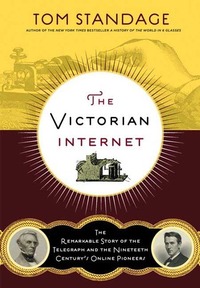Take a photo of a barcode or cover
108 reviews for:
The Victorian Internet: The Remarkable Story of the Telegraph and the Nineteenth Century's On-Line Pioneers
Tom Standage
108 reviews for:
The Victorian Internet: The Remarkable Story of the Telegraph and the Nineteenth Century's On-Line Pioneers
Tom Standage
This was such a lovely book! One of those that you pick up, don't think you'll enjoy, and then you end up loving it! Wonderful, absolutely wonderful anthology of an amazing piece of machinery, and a fascinating snippet of technological history.
informative
inspiring
lighthearted
fast-paced
Extremely well-written history of the telegram. Engaging and informative throughout.
I love it when I learn that the technology of the past was more advanced than I thought it was. In the early 1800s, inventors were dealing with all the main problems you learn about in a networking class today: coding, routing, congestion control, encryption, compression, etc. This book touches on lots of interesting aspects of an important invention and draws comparisons with the Internet today. My only complaint is that it uses a lot of anecdotes which are probably apocryphal, but they're fun to read anyway.
informative
inspiring
slow-paced
This is a fine overview of the development of the telegraph and the impact it had on the world. It’s a short and easy read, and offers several interesting anecdotes. It doesn’t delve too deeply into the material, however. If chapter 7, “Codes, Hackers, and Cheats”, appeals to you, I wholeheartedly recommend [b:The Code Book: The Science of Secrecy from Ancient Egypt to Quantum Cryptography|17994|The Code Book The Science of Secrecy from Ancient Egypt to Quantum Cryptography|Simon Singh|https://d.gr-assets.com/books/1403181687s/17994.jpg|1031975], which covers the history of cryptography. If chapter 5, “Wiring the World”, was more interesting, [b:A Thread Across the Ocean: The Heroic Story of the Transatlantic Cable|410958|A Thread Across the Ocean The Heroic Story of the Transatlantic Cable|John Steele Gordon|https://d.gr-assets.com/books/1424356571s/410958.jpg|400223] looks promising (although I haven’t read it).
The book makes a solid enough case that the Internet wasn’t as revolutionary as we kids of today might think; in many ways, it was an improved telegraph network (at least until the so-called Web 2.0, which at any rate surfaced after this book was written), and many of its significant marks on mankind had already been made a century before. However, while the reader might be convinced by this by simply reading the history of the telegraph, the concluding chapter does a poor job at hammering the parallels home, covering the Internet and it’s similarities (and rarely the differences) very superficially.
Still, it’s a nice read if you’re interested in pre-digital communication technology, like I am.
The book makes a solid enough case that the Internet wasn’t as revolutionary as we kids of today might think; in many ways, it was an improved telegraph network (at least until the so-called Web 2.0, which at any rate surfaced after this book was written), and many of its significant marks on mankind had already been made a century before. However, while the reader might be convinced by this by simply reading the history of the telegraph, the concluding chapter does a poor job at hammering the parallels home, covering the Internet and it’s similarities (and rarely the differences) very superficially.
Still, it’s a nice read if you’re interested in pre-digital communication technology, like I am.
This was an interesting and easy-to-read history of the telegraph and "modern" communications networks, drawing links between the instant communications of the 1800s and this of today's second online world. While the links weren't overly drawn out or focused on (most of the book is simply a history of the telegraph), Standage does make you think about how we view our own communications system and if it really is that different from the dots and dashes of Morse code. I particularly liked a few passages from the final chapter and epilogue for their poignancy today, notably "Given its potential to change the world, the telegraph was soon being hailed as a means of solving the world's problems. It failed to do so, of course - but we have been pinning the same hope on other new technologies ever since...The optimistic claims now being made about the Internet are merely the most recent examples in a tradition of technological utopianism that goes back to the first transatlantic telegraph cables, 150 years ago." and "If any generation has the right to claim that it bore the full bewildering, world-shrinking brunt of such a revolution, it is not us - it is our nineteenth-century forebears. Time-traveling Victorians arriving in the late twentieth century world...would surely find space flight and routine intercontinental air travel far more impressive technological achievements than our much-trumpeted global communications network. Heavier-than-air flying machines were, after all, thought by the Victorians to be totally impossible. But as for the Internet - well, they had one of their own."
I picked this book up out of a bargain bin for $7. I wouldn't recommend you buy it, but don't turn away from it if you find one in a library or cheaper than what I paid as it is an interesting history and Standage does show how it is still relevant today, even if you don't understand the electrical technology behind the telegraph. There was a lot I didn't know about, including Edison's early life as a renowned telegrapher and tinkerer that launched him to what we know him for today. I particularly found the early military impacts interesting as it is almost never talked about in the military histories of the age (for example, did you know there were optical telegraphs used in Napoleon's time, or that the Crimean war was the first to have telegraphic service?).
I am perhaps a strange audience for this book as I don't remember a time without computers and I certainly don't remember telegraphs or even really fax machines! It shows how technology advances (my mom grew up with a Ham Radio operator and hand-wrote her university assignments, but I can't write cursive or speak in Morse code) and while Standage claims not much is different in principle, I feel those who remember the switch to computers and talk of how drastically different life became will get a bigger kick out of this book than I did.
I picked this book up out of a bargain bin for $7. I wouldn't recommend you buy it, but don't turn away from it if you find one in a library or cheaper than what I paid as it is an interesting history and Standage does show how it is still relevant today, even if you don't understand the electrical technology behind the telegraph. There was a lot I didn't know about, including Edison's early life as a renowned telegrapher and tinkerer that launched him to what we know him for today. I particularly found the early military impacts interesting as it is almost never talked about in the military histories of the age (for example, did you know there were optical telegraphs used in Napoleon's time, or that the Crimean war was the first to have telegraphic service?).
I am perhaps a strange audience for this book as I don't remember a time without computers and I certainly don't remember telegraphs or even really fax machines! It shows how technology advances (my mom grew up with a Ham Radio operator and hand-wrote her university assignments, but I can't write cursive or speak in Morse code) and while Standage claims not much is different in principle, I feel those who remember the switch to computers and talk of how drastically different life became will get a bigger kick out of this book than I did.
Not my typical good first book of the new year, but I read all but 20% in Dec. I had hoped to finish it up then, and didn't get to it, so the last bit finished as my first book of the year.
It was alright. I'm not a non-fiction fan, and this was read purely for a challenge. Some of it was quite interesting though. I enjoyed the first several chapters, then it just kept going on and on. Still, liked it overall.
It was alright. I'm not a non-fiction fan, and this was read purely for a challenge. Some of it was quite interesting though. I enjoyed the first several chapters, then it just kept going on and on. Still, liked it overall.
Quick read from the master of lists, Tom Standage. Plenty of history from the world wide web (of wires) including anecdotes about online crime, banking and commerce, cryptography, message routing and online romance. The only thing lacking was spam - and man am I jealous about that.
Author argues that the telegraph did more to shrink the world than the internet has, and I am inclined to agree. That technology was developed to the point of being replaced by the telephone - will something similar happen to our beloved internet someday?
Author argues that the telegraph did more to shrink the world than the internet has, and I am inclined to agree. That technology was developed to the point of being replaced by the telephone - will something similar happen to our beloved internet someday?
This is an entertaining history of the telegraph, and comparison of its social impact to that of the rise of the Internet.





